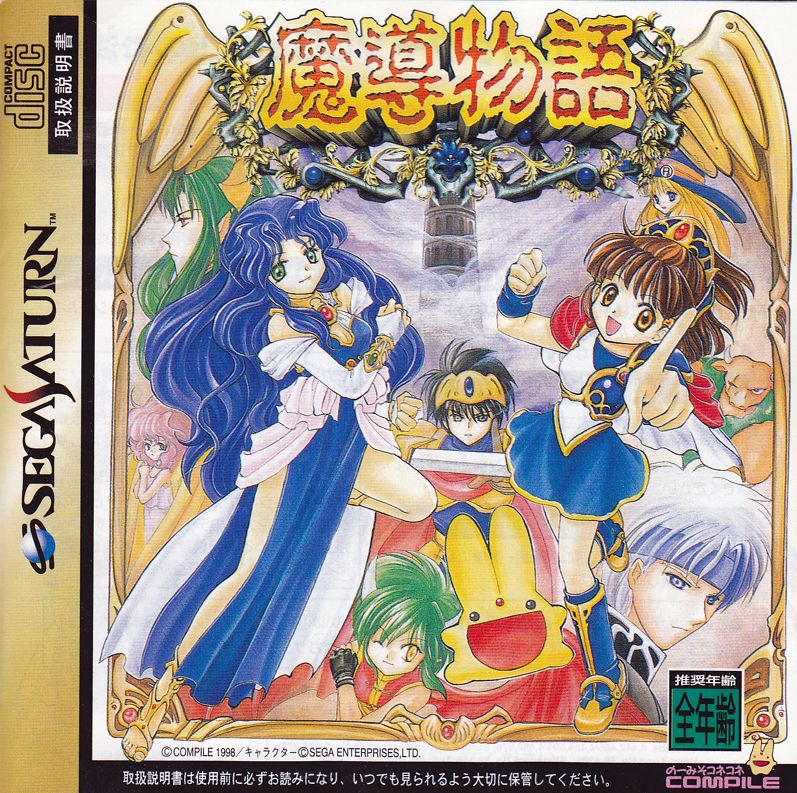Retro Replay Review
Gameplay
The core gameplay of Madō Monogatari strikes a harmonious balance between traditional RPG mechanics and the whimsical charm of the Puyo Puyo universe. Players navigate an isometric world map, guiding young magician Arle through forests, dungeons, and quaint villages in search of clues about the mysterious new plants. Exploration feels rewarding, with hidden pathways, locked doors that require clever spellcasting, and NPC side quests that enrich the world without overstaying their welcome.
(HEY YOU!! We hope you enjoy! We try not to run ads. So basically, this is a very expensive hobby running this site. Please consider joining us for updates, forums, and more. Network w/ us to make some cash or friends while retro gaming, and you can win some free retro games for posting. Okay, carry on 👍)
Combat switches to a turn-based, side-view system that emphasizes strategic spell selection and party synergy. Each ally from the Puyo Puyo roster brings unique abilities—some excel at elemental damage, while others bolster the team with healing or status buffs. Battles can be brisk when you outsmart foes with the right combination of fireballs, ice shards, and support magic, but they also encourage experimentation, as certain enemies are vulnerable to less obvious spells.
Beyond combat, Madō Monogatari offers simple yet engaging mechanics for interaction and progression. Bartering with NPCs via screen overlays allows you to trade potions, rare ingredients, and magical trinkets, and the economy remains balanced enough that grinding isn’t necessary. Conversations with villagers often yield hints or side items, fostering a sense of organic discovery without resorting to lengthy fetch quests.
Graphics
While Madō Monogatari’s visuals may not rival modern 3D powerhouses, its pixel art charm remains undeniably endearing. The isometric world map features vibrant color palettes, and each environment—be it a moonlit swamp or a crystalline cave—boasts distinct thematic details. Textures are simple but effective, with animated sprite details that bring each area to life, from rustling trees to flickering torchlight.
Character sprites are expressive and instantly recognizable to Puyo Puyo fans, capturing Arle’s determined gaze and the playful quirks of her companions. During spellcasting sequences, the game leans into flashy 2D effects: fiery bursts, swirling wind gusts, and sparkling healing lights all display crisp animation frames that heighten the impact of each magical attack.
Dungeon interiors and world-map transitions are smooth, with minimal loading times that preserve immersion. Though the resolution feels dated by current standards, the art direction compensates with imaginative designs, such as oversized mushroom groves and labyrinthine ruins. For players who appreciate retro aesthetics, Madō Monogatari delivers a cohesive visual experience that never feels monotonous.
Story
The narrative thrust of Madō Monogatari centers on Arle’s quest to unravel the secret behind a new breed of magical flora wreaking havoc in the realm. This mystery unfolds at a comfortable pace, revealing environmental clues, cryptic NPC tales, and occasional journal entries that deepen the lore. The writing strikes a playful tone without sacrificing stakes, giving every revelation a touch of Puyo Puyo humor.
Supporting characters from the Puyo Puyo series make cameo appearances, offering both comic relief and heartfelt support. Whether you’re teaming up with a mischievous Puyo buddy or encountering classic series antagonists turned dungeon minibosses, each interaction feels purposeful. Relationships develop gradually, and the script avoids clichés by infusing dialogue with witty banter and lighthearted self-awareness.
Despite its modest scope, the story culminates in a satisfying finale that ties together the mystery of the plants, the history of the magic realm, and Arle’s personal growth. Optional side story threads provide additional context for longtime series fans, while newcomers will still appreciate the straightforward narrative direction. Overall, the tale is memorable enough to drive your journey without overshadowing the gameplay.
Overall Experience
Madō Monogatari offers a refreshing blend of nostalgic pixel artistry and solid RPG fundamentals. The exploration and combat systems reinforce each other, ensuring that neither feels like an afterthought. You’ll be motivated to delve into every corner of the map and experiment with spell loadouts, all while enjoying the familiar faces and humor of the Puyo Puyo franchise.
Accessibility is a strong suit: learning curves are gentle, and a helpful tutorial early on introduces core mechanics without resorting to lengthy text dumps. Resource management remains engaging but forgiving, so you spend more time engaging with the story and battles rather than grinding for gold or consumables.
Ultimately, Madō Monogatari is a delightful RPG for fans of retro visuals, turn-based strategy, and lighthearted storytelling. Its charming world, varied encounters, and approachable design make it an excellent choice for players seeking a concise adventure with personality. Whether you’re a series veteran or a newcomer curious about Puyo Puyo’s RPG roots, this title deserves a spot in your library.
 Retro Replay Retro Replay gaming reviews, news, emulation, geek stuff and more!
Retro Replay Retro Replay gaming reviews, news, emulation, geek stuff and more!




Reviews
There are no reviews yet.